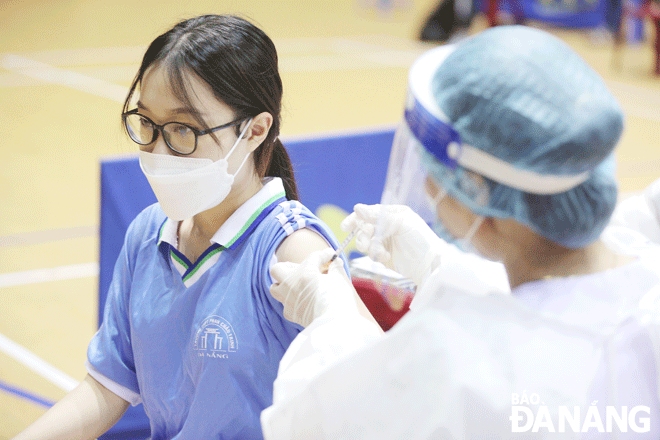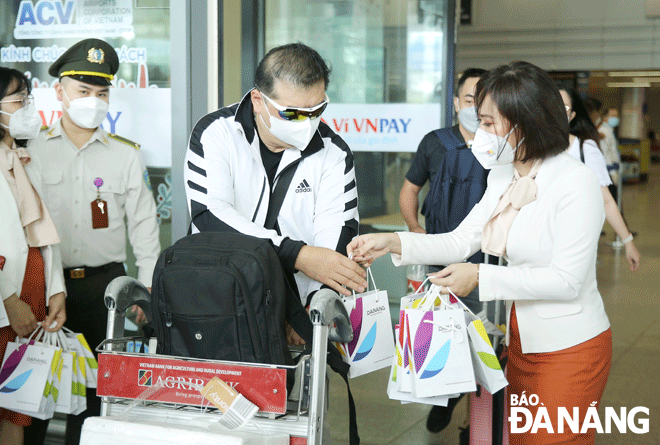What do we benefit from COVID-19?
“What do we benefit from COVID-19” - the question seems time-sensitive because people immediately think of death, pain, economic damage, mental health when it comes to COVID-19. Of course, those have been all too obvious.
 |
| Vaccines are shields opening up a new approach in responding to COVID-19. (Photo taken at the inoculation site of Tien Son Sports Arena in Da Nang). Photo: PHUC AN |
The novel coronavirus (2019-nCoV, or COVID-19) epidemic first broke out in Wuhan, Hubei Province, China in early December 2019 and has been spreading in whole China and the world. COVID-19 has turned the world upside down due to its dangerous nature and rapid speed of spread. Shortly after, the World Health Organization (WHO) on March 11, 2020, has declared the novel coronavirus (COVID-19) outbreak a "global pandemic".
The damage is immeasurable
According to the Worldometer statistics page, as of March 31, 2022, the world has more than 487.2 million COVID-19 cases, 6.16 million deaths; of which Viet Nam has 9.47 million infections with more than 42,400 deaths.
During days in mid-2021, Delta variant with a terrible spreading speed caused a heavy impact on people's livelihoods as well as all aspects of socio-economic life. At the end of August and the beginning of September 2021, Da Nang encountered the most difficult and stressful time.
During 20 days of implementing " shelter-in-place” orders after many cases of Covid-19 were recorded in the community with high-risk infection chains, the city was empty.
At that time, people had to experience countless difficulties, tears, sleepless nights with pensive, austere faces. Many people in uncomfortable protective suits faced the dangers to find ways to stop the spread of the pandemic. Numerous people from the border area to every corner fought to take lives from the death Covid-19 scythe with the command “Protecting people's health and lives is first, foremost”.
Regarding the global economy, the amount of damage has been not small. Since 1870, the world economy has experienced 14 global recessions, of which the COVID-19 recession is forecast to be the fourth deepest recession in 150 years and the deepest one since the end of World War II.
As for the Vietnamese economy, after 35 years of conducting the “Doi moi” (reform policies launched in Vietnam in 1986 )process, it has developed strongly and become one of the countries having the fastest economic growth in the world.
Viet Nam's average GDP growth rate reached 7% per year in the period 2009-2019. Meanwhile, although it is considered one of the few countries that have succeeded in the fight against the COVID-19 pandemic and had a positive growth rate, GDP growth in 2020 was only 2.9%; in 2021, an increase of 2.58% over the same period of the previous year.
On top of that, there have been damages that can not be measured in numbers, which is the decline in mental health. Research data around the world have proven that COVID-19 affects human mental health. Depression, physical weakness and increased fear of illness are not directly related to SARS-CoV-2 itself, but the social consequences dragged by the pandemic.
Outstanding advancement in Medicine
So, what do we benefit from COVID-19?
First of all, the outstanding progress of world medicine needs to be mentioned. As facing COVID-19, besides pandemic prevention measures, loads of countries with modern medicine raced against time to quickly decipher the genome of the novel strain of Coronavirus, thereby accelerating the speed of research, vaccine manufacture and specific remedy. So far, many vaccines have been released with high prevention efficiency such as Pfizer/BioNTech (USA-Germany), AstraZeneca/Oxford (UK - Sweden)
It can be said that this is the key to a more sustainable approach to dealing with COVID-19. Through the fight against the COVID-19 pandemic, WHO wants to send a message “All countries are on the same front in the fight with SARS-CoV-2. The COVID-19 pandemic is not a problem of a few countries or some people, but a global problem, so all countries need to work and cooperate to cope with it.”
 |
| The Viet Nam National Administration of Tourism under the Ministry of Culture, Sports and Tourism of Viet Nam has recently announced the official reopening of tourism activities in the new-normal state since March 15, 2022. IN THE PHOTO: Da Nang welcomes the first guests to the city in 2022. (Photo taken on January 1, 2022, at Da Nang International Airport). Photo: KHANH HOANG |
As for Viet Nam, facing the COVID-19 pandemic with a series of unprecedented problems, the nation has demonstrated appropriate responses for each stage of the pandemic. In the first phase, we tried the utmost to implement social distancing, limit deaths, and at the same time made great efforts to find vaccines, increasing the vaccination rate and being in the world's highest vaccination countries.
In November 2021, the government issued Resolution No. 128/NQ-CP promulgating the temporary regulation "Safely adapting, flexibly, effectively controlling the COVID-19 pandemic". The roadmap and effectiveness of the implementation of this Resolution to date have shown that we have been on the right track.
The change of awareness of the community
Generally, in terms of social life, COVID-19 has allowed us to understand more about the sense of community, about sharing material and spiritual between people. Moreover, COVID-19 is a global pandemic; therefore, health, life have not only been encapsulated within individuals or families but have become a global concern.
On a narrower scale, many people realize something they seem to have understood as facing COVID-19. When encountering loss and pain, we understand more about life’s values and cherish our normal life. COVID-19 tells us to put aside our selfish egos to move toward universality.
Accordingly, recognizing the efforts and dedication of each person at different levels creates motivation and excitement in the working environment and social life. This is not only the aspiration and ambition of the individual but also the transformation of the community's awareness. It is also the wisest, most effective adaptation to use the limited time of human life.
In the face of the COVID-19 pandemic, the majority have felt the value of ordinary things to change their behaviour accordingly. But then, once COVID-19 is over, will people forget?
Reporting by NGUYEN GIA TINH- Translating by T.VY








